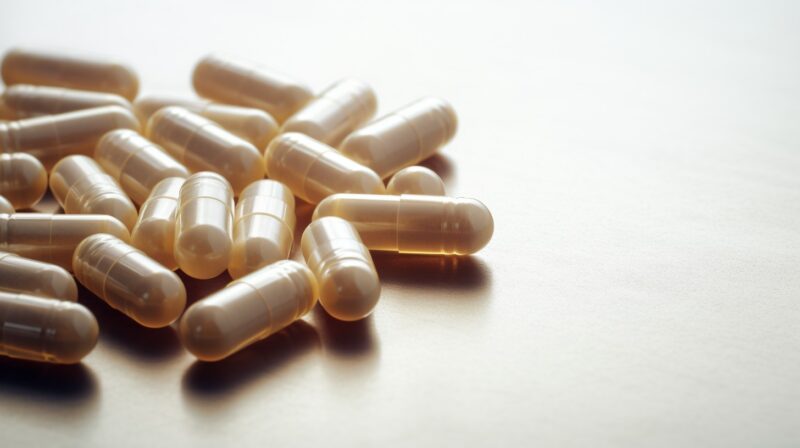Acid reflux, a common health issue experienced by many as heartburn, is characterized by a burning sensation in the chest. It can be triggered by a range of factors such as stress, overeating, consuming spicy foods, smoking, specific medications, and various underlying health conditions.
For those seeking relief, antacids are often the first line of treatment, providing temporary respite. However, they are not a sustainable long-term solution.
In this context, emerging research suggests that probiotics might offer a promising alternative to managing acid reflux more effectively.
Optimal Strains
Selecting the right probiotic strains for acid reflux can be a nuanced and individualized process. While Lactobacillus strains are generally effective, it’s crucial to understand the specific roles and benefits of various probiotic strains to make an informed choice.

Lactobacillus Acidophilus
This probiotic is renowned for its ability to improve digestion and restore gut flora balance. This strain:
- Enhances the digestion of lactose, reducing symptoms of lactose intolerance which can sometimes mimic or exacerbate acid reflux.
- Produces lactic acid, which can help lower the pH in the gut, inhibiting the growth of harmful bacteria.
- Is often found in yogurts and fermented foods, making it easily accessible.
Bifidobacterium
This strain of probiotics plays a significant role in:
- Modulating the gut’s immune response, potentially reducing the chronic inflammation associated with acid reflux.
- Supporting the gut lining’s integrity is crucial in preventing the backflow of stomach acids.
- It is particularly effective in multi-strain probiotic formulations, which can offer a broader range of benefits.
Saccharomyces Boulardii
Unlike other probiotics, this probiotic is a non-pathogenic yeast with unique properties:
- It has been shown to be effective in preventing and treating various gastrointestinal disorders, including acid reflux.
- This strain can survive gastric acidity, making it particularly effective in reaching the gut in active form.
- It’s also beneficial in combating diarrhea, often a side effect of antibiotics that can disrupt gut flora.
Personalization and Experimentation
The effectiveness of a probiotic strain for acid reflux can vary significantly between individuals due to differences in gut microbiomes, lifestyle, and underlying health conditions. This variability underscores the importance of:
- Personalized approach: Consulting with a healthcare professional for tailored advice can be invaluable. They can recommend specific strains based on individual health profiles and needs.
- Experimentation: Finding the right probiotic often involves some trial and error. Monitoring symptoms and making adjustments based on responses to different strains or formulations is key.
Integration into Diet

Incorporating probiotics into your diet is a natural and effective way to combat acid reflux. Here are some suggestions:
- Fermented Foods: Yogurt, kefir, sauerkraut, and kimchi are excellent sources of natural probiotics.
- Probiotic Supplements: These can provide specific strains in concentrated doses. Always choose high-quality, third-party-tested products.
- Prebiotic Foods: Foods like garlic, onions, and bananas provide the necessary nutrients for probiotics to thrive in the gut.
How Do They Alleviate Symptoms?
Probiotics, although not extensively researched in the context of acid reflux, are reputed for their ability to rebalance gut bacteria and tackle H. pylori, a bacterium linked to acid reflux. These beneficial bacteria aid in fortifying the body’s defenses against H. pylori by producing antimicrobial substances and competing for adhesion receptors.
Additionally, probiotics play a crucial role in stabilizing the gut’s mucosal barrier, regulating inflammation, and managing the secretion of inflammatory proteins. According to the World Journal of Gastroenterology, combining probiotics with standard therapy has shown promising results: “The use of probiotics plus standard therapy was associated with an increase in the H. pylori eradication rate and a reduction in adverse events resulting from treatment in the general population.”
This finding underscores the potential of probiotics in enhancing traditional acid reflux treatments.
Role in Gut Health
Probiotics, often described as ‘good’ or ‘friendly’ bacteria, play a pivotal role in maintaining gut health. They contribute to a balanced gut microbiome, which is crucial for digestion, nutrient absorption, and immune function.
Similarly, the role of essential minerals like zinc, which is known for its immune function and wound healing properties, should not be overlooked, especially considering its increased absorption when taken on an empty stomach.
The gut microbiome, a complex ecosystem of microorganisms, can be disrupted by factors like poor diet, stress, and antibiotics. This imbalance, known as dysbiosis, can lead to various gastrointestinal issues, including acid reflux.
Restore Balance in the Gut
Probiotics work by repopulating the gut with beneficial bacteria, thereby restoring balance. They help in:
- Suppressing the Growth of Harmful Bacteria: Probiotics compete with harmful bacteria for nutrients and space, inhibiting their growth.
- Strengthening the Gut Barrier: A healthy gut barrier prevents harmful substances from leaking into the bloodstream, reducing inflammation and the risk of acid reflux.
- Modulating the Immune Response: Probiotics can influence the body’s immune response, potentially reducing inflammation associated with acid reflux.
Emerging Research
The systematic review from MDPI focused on the effectiveness of probiotics in alleviating symptoms of gastroesophageal reflux disease (GERD) in adults. Analyzing 13 prospective studies, the review found that 79% reported positive effects of probiotics in reducing GERD symptoms like regurgitation, heartburn, dyspepsia, and other gastrointestinal issues.
The review highlights the potential of probiotics in managing upper gastrointestinal disorders but emphasizes the need for more rigorous, well-designed clinical trials to confirm their efficacy in GERD treatment. This underscores the emerging role of probiotics in GERD management, while also pointing out the necessity for further detailed research.
Interaction with Proton Pump Inhibitors (PPIs)
According to a study from BMC Gastroenterology, individuals undergoing treatment for gastroesophageal reflux with proton pump inhibitors (PPIs) might experience enhanced benefits from incorporating probiotics into their regimen. While PPIs are known for their effectiveness in suppressing stomach acid, they can also cause side effects such as diarrhea and constipation.
The research indicates that probiotics could play a significant role in alleviating these gastrointestinal side effects, thereby contributing to improved gut health and overall patient comfort during acid reflux treatment.
Safety and Side Effects
While probiotics are generally safe for most people, it’s important to be aware of potential side effects. Although typically mild and transient, some individuals may experience bloating, gas, or constipation when starting probiotics.
Getting to know these potential reactions can help individuals manage their expectations and adjust their probiotic intake accordingly.
Navigating Side Effects
- Start Slow: Gradually introducing probiotics can help minimize side effects.
- Adjust Dosage: If side effects persist, adjusting the dosage or strain of probiotics can be beneficial.
- Consult Healthcare Providers: For persistent or bothersome side effects, consulting a healthcare professional is advisable.
FAQ
Can probiotics be used in children with these symptoms?
Yes, probiotics can be used in children with acid reflux, but it’s essential to consult a pediatrician for the appropriate strains and dosages suitable for their age and health condition.
Do probiotics interact with other acid reflux medications?
Probiotics generally have a low risk of interaction with acid reflux medications, but it’s always best to consult with a healthcare provider before combining them with other treatments.
Are there specific times of the day best for taking probiotics for acid reflux?
While there’s no specific time that’s universally best, taking probiotics consistently at the same time each day, preferably with meals, can be beneficial.
Can changing dietary habits enhance the effectiveness of probiotics in acid reflux management?
Yes, combining probiotics with a diet low in trigger foods for acid reflux (like spicy and fatty foods) can enhance their effectiveness in managing symptoms.
Is there a difference between probiotics in food and in supplement form for acid reflux?
Probiotic foods offer additional nutritional benefits, while supplements often provide higher, more targeted doses of specific strains. Both can be effective for acid reflux, depending on individual needs.
How long should one take probiotics to manage acid reflux?
The duration can vary depending on individual response and severity of symptoms. It’s advisable to consult a healthcare provider for a personalized treatment plan and duration.
Bottom Line
In summary, acid reflux, often triggered by lifestyle and dietary factors, may find relief in probiotics, a more sustainable solution than the standard therapy. Key strains like Lactobacillus Acidophilus, Bifidobacterium, and Saccharomyces Boulardii offer varied benefits in improving gut health and alleviating reflux symptoms.
However, their effectiveness can differ among individuals. Incorporating these probiotics through diet or supplements, under professional advice, can be an effective, personalized approach to managing acid reflux.
